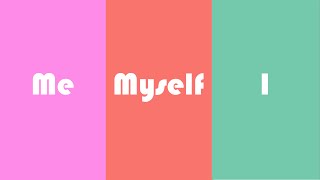(单词翻译:单击)
Me, myself, and I.
Me,myself 和 I。
You may be tempted to use these words interchangeably because they all refer to the same thing,
你会很想将这些字交换使用,因为它们全都表示一样的东西。
but in fact, each one has a specific role in a sentence.
但事实上,每一个字在句子里都有其特定角色。
"I" is a subject pronoun, "me" is an object pronoun, and "myself" is a reflexive or intensive pronoun.
I是主格代名词,Me是受格代名词,而Myself则是反身代名词或强调代名词。
So what does that reveal about where each word belongs?
每个字的角色将如何决定其放置的位置?
Let's start with the difference between subject and object.
我们从主格和受格之间的差别开始吧。
Imagine the subject as the actor in a sentence and the object as the word that is acted upon.
想像一下主格是句子里的行动者,而受格是接受行动的字。
"I invited her but she invited me."
例如:我(主格I)邀请她(受格her),但她(主格She)邀请我(受格me)。
The object can also be the object of a preposition.
受格也可以是介词的受格。
"She danced around me, while he shimmied up to me."
例如:她(主格She)绕着我(受格me)舞蹈,而他(主格he)向着我(受格me)西迷舞过来。

In some languages, like Latin and Russian, most nouns have different forms that distinguish subjects from objects.
在一些语言中,像拉丁文和俄文多数的名词都有不同的形式来区别主格和受格。
However, in English, that's only true of pronouns.
但是在英文里面,只有代名词有这样的特性。
But so long as you know how to distinguish subjects from objects, you can figure out what belongs where.
但只要你会区分主格和受格,你就自然知道什么字该放在什么地方。
And when you encounter a more complicated sentence, say one that involves multiple subjects or objects,
而当你遇到更复杂的句子,比如说一个句子里有好几个主格或受格,
and you're not sure whether to use "I" or "me," just temporarily eliminate the other person, and once again distinguish subject from object.
你不肯定到底要用 I 或用me,那就先把其他人拿掉,再尝试区分主格和受格。
Here's another. You wouldn't say, "Me heard gossip," but sub in "I" and you're good to go.
还有一个例子。你不会说 “Me听到谣言”,但只要把me换成I就好了。
Then what about "myself?"
那myself呢?
This grand character is often substituted for "me" and "I" because it seems more impressive.
这个角色重要的字常常用来取代me和I,因为这样听起来比较厉害。
"Please tell Jack or myself" may sound elegant, but in fact, "me" is the right pronoun here.
例如:“请告诉Jack和我自己(myself)”这句话听起来可能很优雅但其实,“me”才是正确的代名词。
So where should you use "myself"?
所以myself应该用在哪里?
In its function as a reflexive pronoun, "myself" only works if it's the object of a sentence whose subject is "I."
身为反身代名词,“myself”只能在句子的主格是"I"时,myself当受格才是正确的。
"I consider myself the most important pronoun at this year's party."
例如:我(I)认为自己(myself)是今年派对中最重要的代名词。
"Myself" can also add emphasis as an intensive pronoun.
Myself也可以当强调代名词。
"I, myself, have heard others agree."
例如:我(I)自己(myself)有听到其他人同意。
The sentence works without it, but that extra pronoun gives it oomph.
这句子没有了myself也对,但加了myself便增加了其强调性。
To check if "myself" belongs in a sentence, simply ensure that there's also an "I" that it's reflecting or intensifying.
要看看myself到底属不属于某句子,就只要看那个句子里有没有一个被反射或强调的I。
So that's "me," "myself," and "I," ever ready to represent you, yourself, and you.
所以,以上就是me、myself、I三种我的用法,三者随时可用来表示you、yourself、you三种角色的你。


